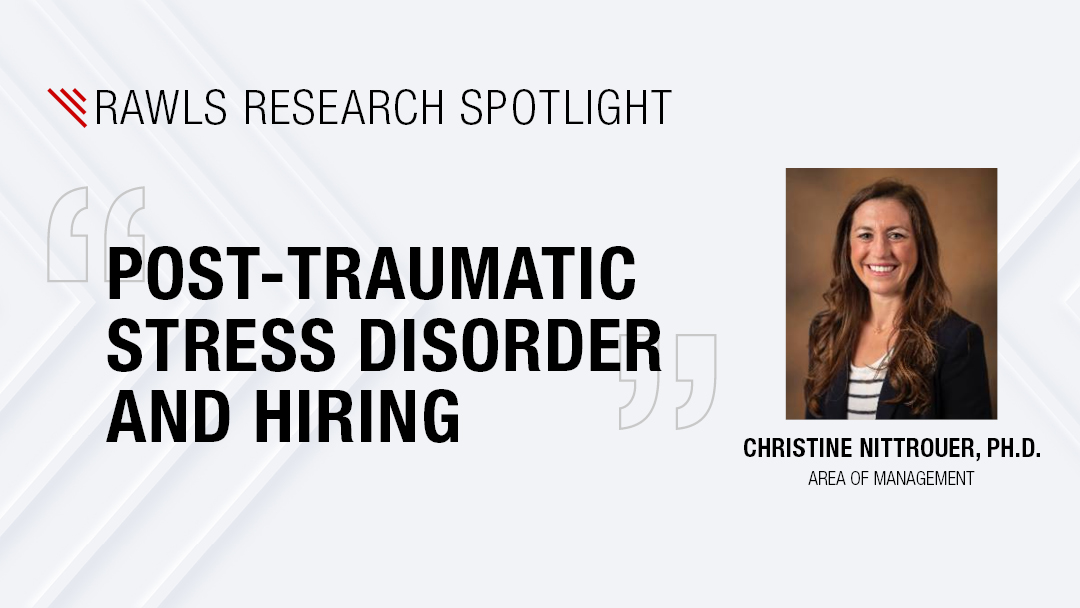
In 2017, a study conducted by CareerBuilder found that up to 70% of recruiters use social media to screen job applicants.
Spotlights
- 16%-24% of veterans post about PTSD on social media platforms.
- PTSD is often stigmatized by professionals, including hiring managers who conduct social media assessments of candidates.
- Veterans with PTSD should limit social media access to known audiences or find support in private, password-protected, anonymized forums.
- Organizations should either avoid social media assessments of candidates or develop data-driven social media assessment policies that are valid and guard against bias.
By now, the idea of recruiters or hiring managers using social media as part of a hiring process is not new. A 2017 study conducted by CareerBuilder suggested that up to 70% of recruiters used social media to screen job applicants.
However, a group of researchers, including Christine Nittrouer, assistant professor of management, at the Jerry S. Rawls College of Business, set out to explore some of the risks that come with using social media assessments (SMAs) when assessing a job applicant.
“One of the big problems [with SMAs] is that there is no structured or consistent way of using the information, so there is no evidence of validity for this practice,” said Nittrouer. “Shedding light on the danger associated with [SMAs] is critical from a practice perspective, particularly when it comes to reducing bias.”
In “Post-Traumatic Stress Disorder and Hiring: The Role of Social Media Disclosures on Stigma and Hiring Assessments of Veterans,” Nittrouer and her fellow co-authors conducted a four-part study into veterans' PTSD disclosures on social media and potential consequences in the hiring process. The article was published in Personnel Psychology, a five-star academic journal.
“Our investigation squarely focuses on the role of discoverable, involuntary disclosures of invisible stigma via social media platforms,” wrote the authors. “Specifically, recruiters may (even inadvertently) discover a veteran applicant's (protected) PTSD status during social media assessments without the consent of the job applicant.”
The first study suggested that 16%-24% of veterans included cues related to having PTSD on social media. The authors estimate that the range represents a conservative floor of the number of veterans posting about their PTSD condition since the posts the researchers could access were public. For example, a veteran's private posts about PTSD could be made available to a hiring manager if the veteran directly connects to the hiring manager in the course of the recruitment process.
The second and third studies suggested that veterans with PTSD were stigmatized more than veterans without PTSD. The second study was based on 290 upper-level business students, and the third study was based on 431 working professionals with hiring experience. Both studies showed a connection between stigmatization and higher levels of suspicion, lower expected job performance and lower intention to interview.
The fourth study, which was based on 298 working professionals, identified perceptions of danger associated with veterans with PTSD as having an additional impact on the hiring decision.
Taking all the studies together, the researchers found that social media posts from veterans that included PTSD cues were often stigmatized by hiring managers conducting an SMA. Once the stigmatization occurred in the participants, they unconsciously became more suspicious of the veteran candidate who had PTSD, and this suspiciousness had a negative impact on the hiring decision.
“Suspicion involves increased levels of cognition or the scrutiny of situations or individuals,” wrote the authors. “The hiring manager may try to find another reason, other than the fact that a job applicant has PTSD, to justify a discriminatory evaluation of such a job applicant.”
Toward the end of the article, the authors offer a discussion of the practical impacts of their findings for both veteran applicants and organizations.
The authors continue to encourage veterans with PTSD to seek support on online communities, but with a heightened sense of caution.
“Veterans, especially those who are looking for jobs, may want to limit access to posts to known audiences or find support in private, password-protected, anonymized forums,” wrote the authors.
For organizations, the authors recommended moving away from using SMAs during the hiring process. If an organization continues to conduct SMAs, the organization should at a minimum develop and enforce consistent SMA policies, as well as training procedures to guard against the influence of stigmatizing information.
